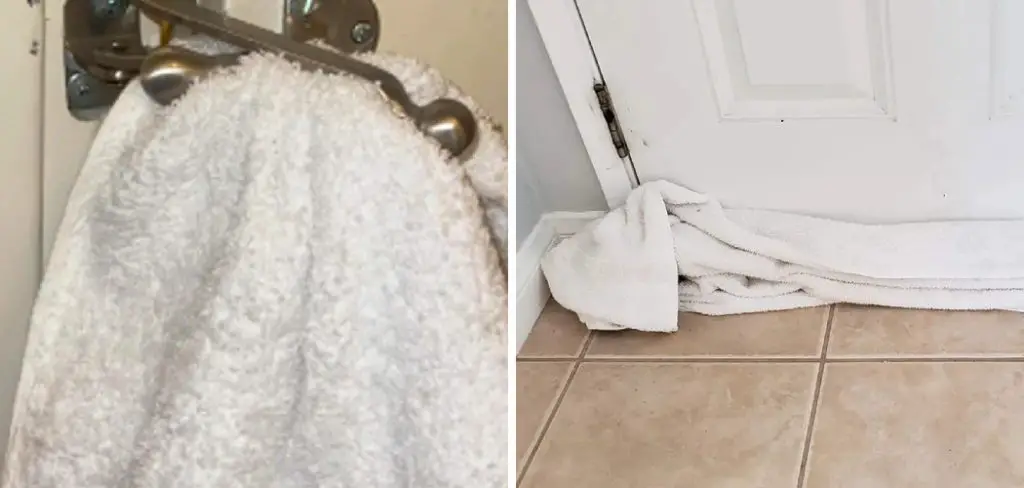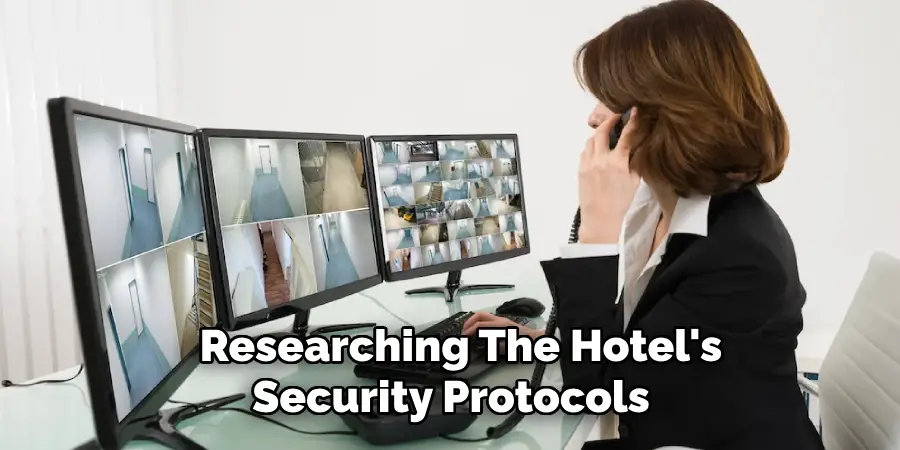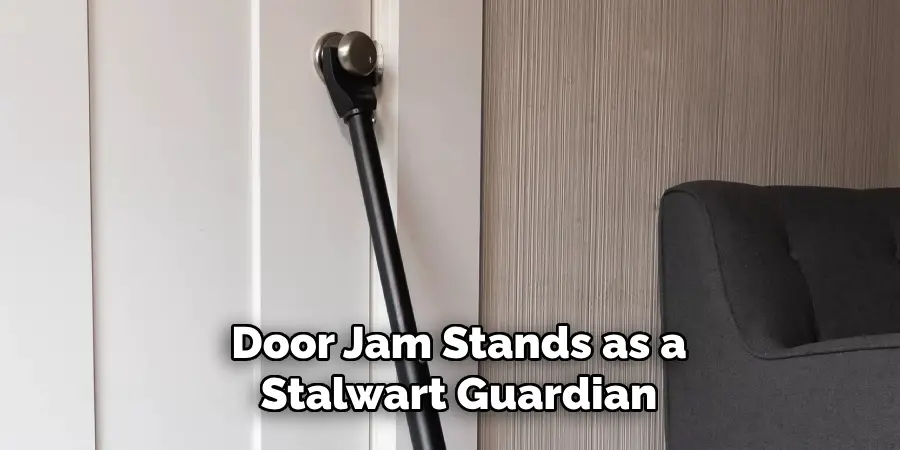Securing a hotel room door with a towel might seem like a simple solution, but it can provide an additional layer of security and peace of mind for travelers. This article aims to provide a comprehensive guide on how to secure hotel room door with towel.

While hotel rooms typically come with standard locks, some guests may feel the need for added security, especially in unfamiliar environments.
Using a towel to secure the door involves placing it over the top of the door and firmly wedging it against the door frame, making it more difficult for the door to be opened from the outside. This makeshift door stopper can serve as a temporary solution in situations where travelers feel vulnerable or unsafe.
However, it’s important to note that this method may not be foolproof and should not replace the use of proper door locks or other security precautions. This article explores the practicalities and considerations of using a towel to secure a hotel room door, offering insights into when and how to implement this strategy responsibly.
Importance of Hotel Room Security
Hotel room security is a critical concern for travelers, as it directly impacts their peace of mind and overall travel experience. Ensuring the safety of personal belongings and oneself while staying in a hotel is essential, especially in unfamiliar locations where one might feel more vulnerable.
Proper security measures can prevent unauthorized entry, theft, and potential harm, allowing guests to focus on their journey without constant worry. With reports of hotel break-ins and other security breaches occasionally making headlines, heightened awareness and proactive measures are prudent.
Utilizing the hotel’s security features such as deadbolts, peepholes, and electronic safes, in combination with supplementary measures like securing the door with a towel, can fortify one’s sense of safety.

Travelers are encouraged to be vigilant and adhere to security best practices to mitigate risks and ensure a secure and enjoyable stay.
Common Concerns About Hotel Room Safety
When it comes to hotel room safety, travelers often have several common concerns that can affect their peace of mind.
One of the primary worries is unauthorized access to their room. Despite the presence of electronic key cards and traditional locks, there is always the fear that someone else might gain entry, either through lost or copied keys. Another significant concern is the security of personal belongings.
Guests frequently carry valuable items such as cash, electronics, and passports, which they want to keep safe from theft. Additionally, privacy invasion can be a troubling issue, with fears surrounding hidden cameras or unauthorized personnel entering the room when it is unoccupied.
Lastly, some travelers are apprehensive about emergency situations, such as fires or medical emergencies, and whether they will have quick and safe exits in such scenarios. Being aware of these concerns and taking proactive measures can significantly enhance the sense of security and well-being during a hotel stay.
Understanding Hotel Room Door Security
Hotel room door security revolves around understanding the various mechanisms and additional measures that can be implemented to ensure a secure environment for guests.

Typically, hotel room doors are equipped with several standard security features including electronic key card systems, deadbolts, and peepholes. Electronic key card systems are designed to prevent unauthorized access by allowing only those with the programmed key card to enter the room.
Deadbolts add an extra layer of security, making it more difficult for intruders to force the door open. Peepholes allow guests to see who is outside their door without opening it, enhancing their control over room access.
In addition to these standard features, guests can employ supplementary measures to further secure their doors. Simple tools like door wedges or portable locks can be very effective. Placing a towel over the top of the door and wedging it against the frame is another quick, albeit temporary, solution that increases resistance against forced entry.
Understanding the limitations of each security measure is crucial; while these methods can enhance security, they should not be relied upon entirely without using the core security features provided by the hotel. For the utmost security, it is always advisable to stay in reputable hotels that prioritize guest safety and to remain vigilant during one’s stay.
Potential Vulnerabilities in Hotel Room Security
Despite the array of security features in modern hotel rooms, there remain several potential vulnerabilities that travelers should be aware of. One major vulnerability is the risk of electronic key card systems being hacked or cloned.
Skilled individuals can sometimes bypass these systems, gaining unauthorized access. Additionally, the deadbolt mechanisms on some hotel doors might be susceptible to physical tampering or lock-picking techniques, especially if the hardware is outdated or poorly maintained.
Another area of concern is the possibility of hotel staff, who have access to master keys, misusing their privileges. While most hotels conduct thorough background checks, the potential for insider breaches cannot be entirely dismissed.

Guests should also be cautious of adjoining rooms with shared doors, as these can sometimes be less secure and might provide an additional entry point if not properly locked from both sides.
Lastly, social engineering—where an intruder manipulates hotel personnel or other guests to gain access to a room—represents a non-technical but equally significant threat. This could involve a person pretending to be a guest who has lost their key or fabricated emergencies to gain entry.
Being cognizant of these vulnerabilities and adopting a proactive approach to personal security can help travelers mitigate risks and enjoy a safer stay in hotels.
Assessing Hotel Room Security Risks
Assessing hotel room security risks involves a detailed understanding of both technical and human factors that can compromise safety.

One of the most crucial steps in this process is researching the hotel’s security protocols before booking. This includes reading reviews and looking for information on whether the hotel has up-to-date security features, such as modern electronic key card systems, CCTV surveillance, and 24/7 security personnel.
Additionally, it’s beneficial to check if the hotel follows stringent staff vetting procedures to minimize the risk of insider threats.
Once at the hotel, performing a personal inspection of the room’s security features is imperative. Ensure that all locks are in good working condition, including deadbolts and chain locks.
Test the peephole to make sure it provides a clear view of the outside hallway, and inspect windows to ensure they cannot be easily opened from the outside. For rooms with adjoining doors, double-check that both sides are securely locked.

Being proactive about your security also means being aware of emergency procedures, such as the location of fire exits and emergency contact numbers. Recognize that while technology can provide robust security measures, human vigilance remains a critical component.
By staying aware and prepared, travelers can significantly reduce the security risks associated with hotel stays, leading to a more secure and enjoyable experience.
Recognizing Signs of Unsecured Hotel Room Doors
Recognizing signs of unsecured hotel room doors is essential for ensuring personal safety during a stay. One immediate red flag is a door that does not close fully or appears misaligned, which might indicate a malfunctioning latch or frame.
Such doors can be easily forced open even if they are locked. It’s important to test the door immediately upon entering the room for the first time; it should close and lock securely without requiring excessive force.
Another concerning sign is a deadbolt that feels loose or wobbles when engaged. This could imply that the deadbolt mechanism might be compromised and not provide adequate protection against unauthorized entry.
Additionally, key card readers that appear scratched, worn, or out of place might suggest recent tampering or a history of forced entries. If the door’s key card system seems unresponsive or inconsistent, this might also indicate a potential fault in the locking mechanism.
Guests should also be wary of multiple scratches or marks around the door’s lock and frame, as these could be evidence of past attempts to break in.

It’s equally crucial to observe the peephole from the inside; it should be clear and undamaged, allowing a full view of the hallway. Any obscurity or tampering with the peephole, like visible glue or blockages, should raise immediate concern.
10 Methods How to Secure Hotel Room Door with Towel
01.Door Wedge:
At the heart of the art of securing hotel room doors with towels lies the simple yet effective technique of using them as door wedges. By rolling a towel tightly and wedging it under the door, guests can create a physical barrier that prevents the door from being opened from the outside.
This method, born of practicality and resourcefulness, serves as the foundation for a makeshift defense that stands as a bulwark against the encroaching tide of intrusion.
02.Reinforced Door Jam:

In the hierarchy of security measures, the door jam stands as a stalwart guardian, a sentinel against the forces of intrusion. By strategically placing a towel along the edge of the door jam, guests can reinforce its structural integrity, making it significantly more difficult for would-be intruders to force their way into the room.
This method, born of strategic thinking and attention to detail, serves as a reminder that in the realm of security, even the most mundane objects can be transformed into formidable defenses.
03.Noise Dampening:
In the delicate dance between perception and reality, noise serves as a potent early warning system, alerting occupants to the presence of unwelcome visitors.
By placing a towel along the bottom of the door, guests can dampen the sound of footsteps and other noises from outside, making it easier to detect potential threats before they escalate. This method, born of psychological insight and strategic thinking, underscores the importance of proactive measures in the defense against intrusion.
04.Visual Deterrence:
In the psychology of security, perception often shapes reality, with the mere appearance of fortification serving as a deterrent to would-be intruders. By prominently displaying towels along the edges of the door, guests can create the impression of a fortified barrier, dissuading opportunistic individuals from attempting unauthorized entry.
This method, born of deception and strategic thinking, demonstrates the power of visual cues in shaping behavior.
05.Privacy Enhancement:
In the realm of personal space, privacy stands as a cherished commodity, a sanctuary against the prying eyes of the outside world. By placing towels along the edges of the door, guests can enhance their sense of privacy, creating a physical barrier that shields them from unwanted intrusion.
This method, born of a desire for personal autonomy and security, serves as a reminder that in the realm of hospitality, the comfort and safety of guests should always be paramount.
06.Temperature Regulation:
In the delicate dance between comfort and convenience, temperature regulation plays a vital role in the overall guest experience.
By placing towels along the edges of the door, guests can prevent cold drafts from seeping into the room during the winter months, or keep cool air conditioning from escaping during the summer months.
This method, born of practicality and attention to detail, underscores the importance of ensuring the comfort and well-being of guests throughout their stay.
07.Barrier Against Pests:
In the labyrinthine corridors of urban life, where the hustle and bustle of everyday existence intertwine with the imperatives of hygiene and sanitation, pests often lurk in the shadows, waiting to infiltrate our sanctuaries.
By placing towels along the edges of the door, guests can create a physical barrier that prevents pests such as insects and rodents from gaining entry into the room. This method, born of a desire for cleanliness and hygiene, serves as a reminder that in the realm of hospitality, the comfort and well-being of guests should always be paramount.
08.Emergency Preparedness:
In times of crisis, when chaos threatens to breach the sanctity of our dwellings, emergency preparedness stands as a last line of defense against the encroaching tide of intrusion.
By placing towels along the edges of the door, guests can create a physical barrier that provides an additional layer of protection in the event of an emergency situation. This method, born of foresight and strategic thinking, underscores the importance of taking proactive measures to ensure the safety and security of guests throughout their stay.
09.Enhanced Sense of Security:
In the realm of hospitality, where the comfort and well-being of guests are paramount, a sense of security serves as the cornerstone of a positive guest experience. By placing towels along the edges of the door, guests can enhance their sense of security, knowing that they have taken proactive measures to fortify their sanctuaries against potential threats.
This method, born of a desire for peace of mind and tranquility, serves as a reminder that in the realm of hospitality, the little things can make all the difference.
10.Customized Fortification:
In the grand tapestry of hotel security, where the needs and preferences of guests vary widely, customized fortification stands as the ultimate expression of hospitality. By placing towels along the edges of the door in a manner that suits their individual needs and preferences, guests can create a customized defense that reflects their unique sense of style and comfort.
This method, born of personalization and attention to detail, serves as a reminder that in the realm of hospitality, the guest experience is paramount, and every effort should be made to ensure their comfort, safety, and well-being.
Things to Consider When Securing Your Hotel Room
When taking steps to secure your hotel room, it’s important to balance practicality with efficacy while keeping your peace of mind a top priority. Here are several factors to consider:
- Room Layout and Features: Evaluate the layout of your room and its specific features, such as the location of doors and windows. Understanding the structural elements can help in identifying potential vulnerabilities and optimizing the placement of towels for maximal effect.
- Accessibility: Ensure that the methods employed to enhance security do not hinder your ability to move around freely within your room. Emergency exits should remain accessible, and no barriers should impede your ability to leave swiftly in case of an emergency.
- Comfort: The additional security measures should not compromise your comfort. Properly placed towels can enhance security without making you feel overly confined or uncomfortable during your stay.
- Hotel Policies: Be aware of the hotel’s policies regarding modifications to your room. While using towels may be a discreet way to increase security, more noticeable changes should align with hotel guidelines to avoid any conflicts or misunderstandings.
- Emergency Procedures: Familiarize yourself with the hotel’s emergency procedures. Knowing how to respond in an emergency is crucial, and your security measures should complement these procedures, not hinder them.
- Observation: Pay attention to your surroundings within the hotel. Noticing unusual activity or potential security threats can help you make more informed decisions about the necessary adjustments to reinforce your room.
Conclusion
In the intricate dance between hospitality and security, the importance of even the smallest details cannot be overstated. The simple act of strategically placing towels along the edges of a door showcases how ordinary objects can be transformed into robust defenses, enhancing the overall guest experience.
From reinforcing the door’s structural integrity to noise dampening and pest deterrence, these measures provide a multifaceted approach to ensuring guests’ comfort, privacy, and safety. Thanks for reading, and we hope this has given you some inspiration on how to secure hotel room door with towel!
